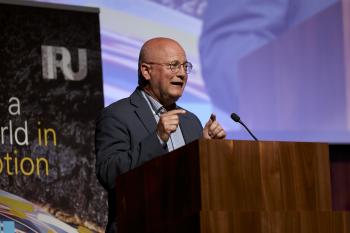The EU’s road transport sector is already decarbonising. But scaling up progress requires smart regulation, targeted investment and coordinated action. This was the central message from IRU’s recent high-level conference in Brussels.
Hosted at the Representation of the State of Baden-Württemberg to the EU, IRU’s event, “Decarbonising EU road transport: Solutions for 2030 and beyond”, brought together over 200 key stakeholders, including Members of the European Parliament, the European Commission, national governments, transport operators, vehicle manufacturers and financial institutions.
With road transport moving over 75% of goods and 50% of all inland collective passenger transport in Europe, the sector plays a central role in achieving the EU’s climate targets. Discussions at the event focused on how to translate ambition into practical action, scale up clean technologies, ensure the right infrastructure is in place, and maintain the economic viability of transport services.
IRU President Radu Dinescu said, “The commercial road transport sector is not at the starting line, we are already on the road to decarbonisation.
“To scale up, we need the right policies, infrastructure, and financial tools to ensure this transition is cost-effective and inclusive, especially for Europe’s small and medium-sized operators."

IRU EU Advocacy Director Raluca Marian said, “What we heard from the discussions is clear: there is strong consensus on the need to decarbonise road transport, and a united call for pragmatic support.”
“Operators are already investing in cleaner fleets, but they cannot do it alone. They need reliable infrastructure, clear incentives and a stable policy framework to move forward with confidence,” she added.
Speakers from across the sector and EU institutions echoed the importance of a flexible approach tailored to different transport segments and national realities. Concerns were raised about affordability and feasibility, particularly for SMEs and rural areas.
Key obstacles identified included inadequate infrastructure, grid limitations, permitting delays, and high upfront investment costs.
Participants highlighted the urgent need to scale up charging and refuelling infrastructure, expand grid capacity, streamline permitting processes, and support alternative fuels.
Electrification was noted as a key pathway, especially for urban and regional operations, though not the only solution.
Closing the event, Belgium’s Federal Minister for Mobility, Climate and Environmental Transition, Jean-Luc Crucke, said, “Decarbonisation will enable better competitiveness. The two go hand in hand."

“We must build on Europe’s diversity of cultures, geographies and transport needs to shape sustainable mobility solutions that work for all. That means investing more in research and innovation, supporting those who take risks, especially businesses and vulnerable populations, and working together across sectors and Member States to succeed,” he added.
The conference confirmed that the road transport sector is ready and committed to decarbonisation. The task ahead is to build the policy, financial and infrastructural framework to deliver on the EU’s climate goals while keeping transport efficient, resilient and accessible.




































































































